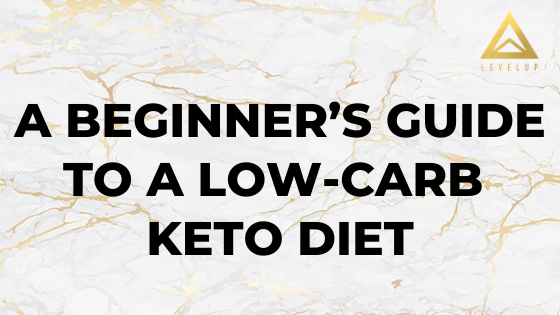
A Beginner’s Guide to A Low-Carb Keto Diet
The ketogenic or “keto” diet is the hottest new diet trend and flips conventional nutrition advice that tells you to avoid fat on its head, encouraging the intake of fat in the pursuit of weight loss and better health. While this may seem completely counterintuitive, there is significant research to support that this low carb diet allows you to manage weight and other health concerns.
What Is A Low-carb Keto Diet?
A keto diet is a high fat, extremely low carb diet that is quite trendy right now, but not new. The ketogenic diet was first used in the 1940s as a treatment for epilepsy but lost favor until the mid-90s when it was revitalized due to a TV movie starring Meryl Strep. Recently, celebrities have started to use this diet for weight loss benefits, and the trend took off.
Although it may be surprising that eating more fat can help with weight loss and improve health, the keto diet works by changing the body’s metabolism. When you severely restrict carbohydrates, the body is forced to use compounds made from fat called ketone bodies as fuel, shifting the body into a metabolic state called ketosis.
Restricting carbohydrates allows the body to access the almost unlimited stored calories available in stored fat. It also decreases blood sugar and insulin levels. This metabolic shift results in less hunger, improved blood sugar, decreased insulin resistance, and improved brain function.
Health Benefits Of Keto
Eating a keto diet has many possible health benefits. Here are a few of the highlights:
- Weight loss. A keto diet can help you lose weight by increasing satiety and changing metabolism.
- May reduce the risk of type 2 diabetes and decrease insulin resistance.
- Improves cholesterol and blood pressure.
- May slow the progression of cancer.
- Supports brain health and may reduce the risk of Alzheimer’s and Parkinson’s disease.
- May help improve acne.
In addition to weight loss, there are many other emerging benefits for improving health and well-being.
Different Types Of Ketogenic Diets
The standard keto macronutrient breakdown is 75% fat, 20% protein, and 5% carbohydrates. There are other versions of keto that have popped up in the keto communities, to help people tailor this low carb diet to meet their personal needs, these include:
- Targeted keto. Standard keto, but with increased carbs around workouts.
- Cyclical keto. Involves cycling eating low carb a few days a week, followed by higher carb to help increase athletic performance.
- “Dirty” keto. Allows eating unhealthy foods, as long as they are low carb.
- “Lazy” keto. Eating keto without tracking calories or other nutrients.
Although these are popular methods of following the keto diet, the research around the health benefits of keto is based on the “standard” keto diet.
What Foods Should You Avoid On The Keto Diet?
High carbohydrate foods are not approved keto diet foods and should be avoided. These include:
- Grains and starches
- Most fruit
- Beans and legumes
- Potatoes and other root vegetables
- Foods high in sugar
- Sugar-sweetened beverages
What Foods Can You Eat?
Many ketogenic diet foods are allowed. These include:
- Meat, chicken, fish
- Eggs
- Butter and cream
- Cheese
- Nuts and seeds
- Fats and oils
- Avocados
- Low-carbohydrate vegetables
- Herbs and spices
- Small portions of berries
Tips For Eating Out On A Ketogenic Diet
What makes keto easy for people is that it is quite simple to follow the diet by tweaking your order to include keto diet foods, even if you eat out a lot. Most restaurants offer a dish with some type of protein and a side of vegetables. Just hold the rice, pasta, or bread.
Salads can also fit into the list of approved ketogenic diet foods; just avoid croutons or other high carbohydrate toppings. Be sure to include a hefty dose of protein with your salad and top it with high fat options like avocado or cheese.
You can also ask for many sandwiches, like burgers, to be wrapped in lettuce instead of the bun. By tweaking your regular order slightly, most restaurant options can fit effortlessly into the approved keto diet food list.
Supplements For A Ketogenic Diet
Supplements are not required on a keto diet, but some are popular choices. Here are a few to consider:
- Multivitamin. Since you will be eliminating many foods on this diet, a quality multivitamin may be beneficial.
- MCT oil. MCT is a quick-metabolizing fat that can be used for energy, as it is converted into ketones, regardless of whether the body is in or out of ketosis.
- Exogenous ketones. These may help quickly raise the body’s ketone levels, easing the transition into ketosis. These artificially put you in ketosis, diet changes are still required.
- Keto protein. Low-carb protein powder can help you increase your protein on keto, helping you stay full longer.
A keto diet is an excellent option for healthy people to lose weight and improve metabolism. It should be avoided by people with certain medical conditions or those who are pregnant or breastfeeding. Speak to your doctor before trying this diet to see if it is the right option for you to achieve your weight loss goals.
